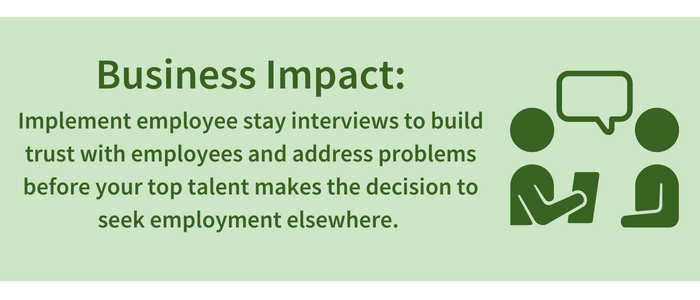The Era of Stay Interviews Has Arrived

The era of “The Great Resignation” is well underway and while the idea of employees staying with a company until they grow old and grey has been dissipating for years, the pandemic has quickly created a workforce where employers are happy if they can keep just a fraction of their good talent for a short period of time.
Exit interviews have slowly become common place in the working world and for good reason. There is valuable information to be learned from those conversations. However, exit interviews are a defensive strategy and it’s time for employers to switch to offense and figure out before employees leave what’s working and more importantly, what is not. Large employers have already begun conducting stay interviews, and now is the time for small and medium employers to follow suit.
Think about a relationship you voluntarily choose to partake in. When that relationship ended, you probably wanted to know why. The other person gave their reasons but the relationship has still ended. Sure, you can take that information and be better in the future, but you still lost a person and that relationship that you invested a lot of time and energy into. Thinking back, if you had made time to talk about what was going well and what you could do better while you were in the relationship, maybe it wouldn’t have ended.
So how do you make sure your employees stay with you and, dare we say, even develop a loyalty that will keep them with your company for years to come? Here are a few tips on an effective stay interview process:
- Managers need to be the ones conducting stay interviews – we know your managers are busy and some of them will likely need to be pushed to schedule these conversations, but the truth of the matter is that having them conduct the conversations is crucial. When managers have these conversations, they are actively building trust and creating an open dialogue with their employees. This will increase the likelihood that an employee will come to their manager in the future with concerns or questions, it shows employees that their direct manager has a vested interest in their happiness and we all know that often times the manager relationship plays a large role in an employee’s decision to leave a company.
- Conversations should be one on one and in person – yes, it would be easier and quicker to send out a mass survey, but it leaves employees feeling detached. They may provide you with accurate information, but should they find a job next week they won’t have that personal discussion and connection to look back on which may ultimately be the thing that keeps them from leaving.
- Have your questions ready – the same questions should be asked to everyone and they should not only include questions determining what the employee is happy with but also what could get them to leave.
- Consider engaging a third party when conducting interviews. Having a neutral outside observer can help to remove any bias from your reporting. Being seen as unbiased will also elicit more honest feedback, that employees might hesitate to provide to management.
Something to keep in mind, don’t conduct Stay Interviews just so you can say you did them. Short and simple, none of this will mean anything if nothing is done with the information received. In fact, if you learn about problems that your employees are facing and then ignore it, you could actually make the situation worse. However, if you do follow through, you will gain loyal employees for a long time to come.
By implementing stay interviews, employers can ensure that they are doing all they can to retain top talent and position themselves as an employer of choice.
Written by
Emily Buerger

